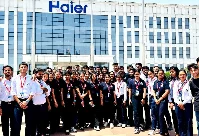Choosing engineering as a profession may not be as tricky as picking an engineering branch. After clearing the engineering entrance tests, it is time to choose a specialization, and the choice mostly relies on the candidates interests. Further, engineering is among the most popular post-high school degree programs.
So, with foundations in various disciplines, such as Architectural, Computer Science, Electrical, Mechanical, etc., the employment opportunities in this subject are vast. However, with more incoming students in the programs above, competition for admission and employment has unavoidably intensified. In addition to the core engineering specializations, various developing courses provide an abundance of employment options.
So this post will make all the aspiring engineers aware of the courses currently prevailing so that they can make the right choice.
Top Engineering Courses Students Can Consider
Mechanical Engineering
Mechanical Engineering is among the most diverse engineering disciplines. Likewise, the discipline encompasses all aspects of life, including contemporary living and the human body, a complicated mechanism.
Also, a mechanical engineer must serve several sectors, including biotechnology, aircraft, cars, semiconductors, computers, automation, energy conversion, etc.
So regardless of the specific route taken by the applicant, mechanical engineering programs give a multitude of professional opportunities.

Civil Engineering
Civil Engineering is among the first academic disciplines. This course covers the structured environment that one observes around them. The course deals with the construction materials that define modern civilization. Civil engineers develop bridges on roads, highways, trains, airports, and subway stations, among other structures. Further, the impact of a civil engineers job on day-to-day living is so profound that no one even sees it.
The duties of a civil engineer extend beyond the construction of structures and bridges. Civil engineers can secure a place in the aviation industry, the construction of jetliners, the automobile sector, and several other industries. They are also part of the shipbuilding, electricity industries, and others. Their duties include designing and constructing infrastructure.
Civil engineering is highly intriguing and exciting since one can see the outcomes of ones efforts in the shape of buildings, bridges, dams, railroads, etc. One may earn a considerable income in this sector.
Petroleum Engineering
A curriculum in Petroleum Engineering emphasizes a variety of subjects, including thermodynamics, fluid mechanics, transport phenomena, material characteristics, and material strength. Moreover, this engineering courses objective is to educate students on the skills necessary to assess effectively and design structures, well methods, drilling operations, and optimize resource development and management.
Machine Learning
Students who wish to develop highly equipped systems employing data science and analytical software are increasingly selecting Machine Learning as their major. The objective of the Machine Learning Engineering program is to educate students with the knowledge required to build and develop programs that enable machines to accomplish specific tasks without being physically directed to do so.
Electrical & Electronics Engineering (EEE)
Electrical & Electronics Engineering (EEE) is concerned with the possibilities, requirements, and issues associated with the electrical, computers, telecommunication, and electronics sectors. The course concentrates on the fabrication and design of electronic devices and the electrical and other components of complicated systems.
Electronics and Communication Engineering
Electronics and Communication Engineering encompasses the design, development, and production of electronic equipment and communication systems. The engineering course provides a comprehensive understanding of analog transmission, fundamental electronics, solid-state devices, microprocessors, digital-analog communication, etc.
Information Technology
Information Technology engineering course is an approach to building and implementing information systems based on software engineering. This discipline of engineering utilizes computers, storage, networks, and other hardware & system components to manage and modify information/data.
Computer Science & Engineering
Computer Science Engineering is a concept that deals with the design, development, and administration of data systems of both software & hardware operations. Also, it includes numerous subjects relating to computation, computer languages, program design, software, and hardware and merges several branches of computer science.
Conclusion
This was just a small introduction to the career opportunities in engineering following your 12th. Several vast options in engineering would land you up in high-paying careers. Secure your career with Accurate Institute and join one of our highly-demand engineering courses. Reach us out for more information.



















